Global Down Syndrome Foundation & Down Syndrome Diagnosis Network Sign Multi-Year Collaboration Agreement
June 3rd, 2025 by Palmer Brooks

Denver, Stillwater, Minn. –June 3, 2025 – Today, Global Down Syndrome Foundation (GLOBAL) and Down Syndrome Diagnosis Network (DSDN) are proud to announce a multi-year collaboration agreement to educate moms of children with Down syndrome – particularly those in the early years – about important medical care resources and research opportunities.
The agreement builds on GLOBAL and DSDN’s past five year collaboration and ensures hundreds of DSDN Rockin’ Mom® Retreat attendees can continue to participate in the GLOBAL Research & Medical Care Roundtable (GLOBAL Roundtable) as a free benefit. It also provides new collaboration and support for DSDN’s core parent resources, including peer-to-peer support groups and online communities hosted in the DSDN App, where families connect by birth year, co-occurring conditions, and shared identities.
The GLOBAL Roundtable has educated over 900 moms of infants and young children on cutting-edge scientific breakthroughs, clinical trials, medical best practices and more. Surveys associated with the GLOBAL Roundtable consistently average 4.8 out of 5, highlighting its impact. Anyone who has registered for the DSDN Rockin’ Mom® Retreat can register for the GLOBAL Roundtable for free. This year’s DSDN Rockin’ Mom® Retreat will be held in Pine Mountain, Georgia from September 19-20. The GLOBAL Roundtable includes welcome remarks from DSDN Executive Director, Melissa Shutwell, GLOBAL President & CEO, Michelle Sie Whitten, and GLOBAL Vice President for Research and Medical Care, Bryn Gelaro. Below is the 2025 GLOBAL Roundtable panel of renowned Down syndrome experts:
- Joaquín Espinosa, PhD, Executive Director, Linda Crnic Institute for Down Syndrome (Crnic Institute) – Espinosa will discuss the latest research topics (including the first pediatric immune system dysregulation Jak Inhibitor clinical trial) from the Linda Crnic Institute for Down Syndrome.
- Nicole Baumer, MD, MEd, Director, Anna and John J. Sie Center for Down Syndrome at Children’s Hospital Colorado – Baumer will provide an overview of neurodevelopmental conditions (including Autism, ADHD) in early childhood and ways to support.
- Emily McCourt, MD, Chief of Pediatric Ophthalmology, University of Colorado Anschutz Medical Campus – McCourt will discuss the eye care needs for children with Down syndrome during their first few years of age (including keratoconus, strabismus, and glaucoma).
- Sujata Bardhan, MS, PhD, Program Director in the Intellectual and Developmental Disabilities Branch at the Eunice Kennedy Shriver National Institute of Child Health and Human Development (NICHD), National Institutes of Health (NIH)– Dr. Bardhan will discuss The NIH INCLUDE Project: Accelerating Research Discoveries for People with Down Syndrome Across the Lifespan (including potential for families to get involved and participate).
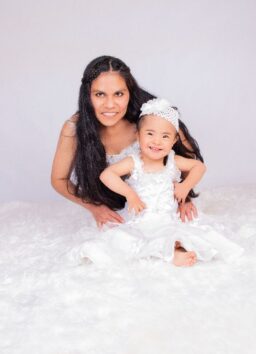
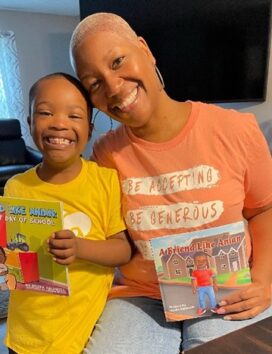
“DSDN has supported more than 25,000 parents through our online peer-to-peer support groups over the past 10 years and has welcomed over 3,000 moms to our annual Rockin’ Mom Retreats,” says DSDN Executive Director and mom to a 9-year-old with Down syndrome, Melissa Shutwell. “The Rockin’ Mom Retreat is a chance to connect, recharge, and be inspired—and thanks to GLOBAL’s support, it’s also a space where attendees can stay informed about the latest research and medical care for their children. The GLOBAL Roundtable is a favorite among many of our moms, and we’re grateful to continue this collaboration to keep such a valuable resource at the heart of our retreat for years to come.”
“We have supported DSDN from its very early years, and we are amazed and impressed at how fast the organization has grown,” says Michelle Sie Whitten, GLOBAL President & CEO, and parent of a young adult with Down syndrome. “The information and network they provide for moms and families is so important and we are proud to be a part of that. Any mom who hasn’t attended a Rockin’ Mom Retreat should absolutely check it out!”
“Every year it is exciting to work with Melissa and her team and bring together world renowned Down syndrome experts to speak at the DSDN Rockin’ Mom Retreat GLOBAL Roundtable,” says Bryn Gelaro, GLOBAL Vice President of Research & Medical Care. “While the complimentary mimosa or sangria makes things fun, these moms are super smart and contribute so much to the conversation. I’m convinced this not only helps their own children but their local communities as well.”
To learn more about the DSDN Rockin’ Mom® Retreat, visit https://www.dsdiagnosisnetwork.org/mom-retreat-registration.
###
About the DSDN
The Down Syndrome Diagnosis Network (DSDN) is the leading organization dedicated to supporting families who receive a Down syndrome diagnosis for their child. Since 2014, DSDN has supported more than 25,000 families through peer-to-peer support, medical condition-specific groups, educational resources, and community-building experiences. DSDN creates safe, inclusive spaces for parents to share their experiences, access real-time support, and build lifelong relationships that strengthen their ability to care for both their children and themselves.
In addition to its robust parent network, DSDN is a national leader in improving the Down syndrome diagnosis experience. The organization partners with healthcare professionals to provide training, resources, and direct feedback from families to ensure that diagnoses are delivered with empathy, accuracy, and immediate access to support. Through this work, DSDN is helping raise the standard for how Down syndrome diagnoses are shared and received.
DSDN is best known for its vibrant online support groups and its annual Rockin’ Mom® and Rockin’ Dad™ Retreats, which have welcomed thousands of parents for weekends of connection, rest, and inspiration.
Learn more at www.dsdiagnosisnetwork.org, and follow DSDN on Facebook, Instagram, LinkedIn, and TikTok.
About Global Down Syndrome Foundation
The Global Down Syndrome Foundation (GLOBAL) is the largest non-profit in the U.S. working to save lives and dramatically improve health outcomes for people with Down syndrome. GLOBAL established the first Down syndrome research institute and supports over 400 scientists and over 2,500 patients with Down syndrome from 33 states and 10 countries. Working closely with Congress and the National Institutes of Health, GLOBAL is the lead advocacy organization in the U.S. for Down syndrome research and care. GLOBAL has a membership of over 100 Down syndrome organizations worldwide, and is part of a network of Affiliates – the Crnic Institute for Down Syndrome, the Sie Center for Down Syndrome, the University of Colorado Alzheimer’s and Cognition Center – all on the Anschutz Medical Campus, and the GLOBAL Adult Down Syndrome Clinic at Denver Health.
GLOBAL’s widely circulated medical publications include Global Medical Care Guidelines for Adults with Down Syndrome, Prenatal & Newborn Down Syndrome Information, and the award-winning magazine Down Syndrome World TM. GLOBAL also organizes the annual AcceptAbility Gala in Washington DC, and the annual Be Beautiful Be Yourself Fashion Show, the largest Down syndrome fundraiser in the world. Visit globaldownsyndrome.org and follow us on social media Facebook, X, Instagram, and LinkedIn.
###
GLOBAL Raises $450,000 at their AcceptAbility Gala as Celebrities & Congress Step Out for People with Down Syndrome
May 23rd, 2025 by Palmer Brooks
Global Down Syndrome Foundation Honored Reps. Aderholt and DeGette at Event that Featured Multiplatinum Artist & Actor Phillip Phillips and Inclusive Dance Team
2025 AcceptAbility Gala Step & Repeat Photos
2025 AcceptAbility Gala Program Highlights Photos

Denver, CO, May 23, 2025 – On Wednesday, the Global Down Syndrome Foundation (GLOBAL) held its seventh annual AcceptAbility Gala, Washington DC’s largest fundraiser for people with Down syndrome, raising $450,000 to support important research and medical care benefiting people with Down syndrome. Representatives Robert Aderholt (R-AL) and Diana DeGette (D-CO) received GLOBAL’s highest honor, the Quincy Jones Exceptional Advocacy Award, and pledged their continued strong advocacy in Congress to improve the lives of people with Down syndrome.
“At GLOBAL, we work hard every day to elongate life and improve health outcomes for our loved ones with Down syndrome,” says GLOBAL Co-Founder, President, and CEO, Michelle Sie Whitten. “Last night we brought together a room full of bipartisan support from Congress, NIH leadership, self-advocates, families and corporate leaders, all celebrating the impact of GLOBAL’s work and a brighter future for people with Down syndrome. The joy and excitement at our event, and the tangible outcome of our work together, is truly rewarding!”
“People with Down syndrome are a beautiful reminder that we are all fearfully and wonderfully made in God’s image,” says Congressman Robert Aderholt. “I am honored to receive the Quincy Jones Exceptional Advocacy Award from GLOBAL and to support their important mission to extend life and improve health outcomes for individuals with Down syndrome. Last night’s AcceptAbility Gala was truly inspiring. It was a joy to be surrounded by so many incredible self-advocates, their families, dedicated professionals, and fellow Members of Congress. The evening underscored how vital continued investment in Down syndrome research is—not just for improving health—but for affirming the dignity and God-given worth of every life. It sends a powerful message to the world that individuals who are differently-abled have unique value and purpose.”



“It is an honor to be recognized by the Global Down Syndrome Foundation with the Quincy Jones Exceptional Advocacy Award,” says Congresswoman Diane DeGette. “Last night’s AcceptAbility Gala was truly a celebration of people with Down syndrome and what biomedical research at the NIH is doing to improve their lives. I am proud to have reintroduced the bipartisan DeOndra Dixon INCLUDE Project Act earlier this week which will ensure NIH continues to pursue innovative and groundbreaking research that includes people with Down syndrome. It is amazing what GLOBAL and my dear friends John Sie and Michelle Sie Whitten have built at the Crnic Institute and the Sie Center for Down Syndrome in Colorado. Together, we are creating a brighter future for children and adults with Down syndrome.”
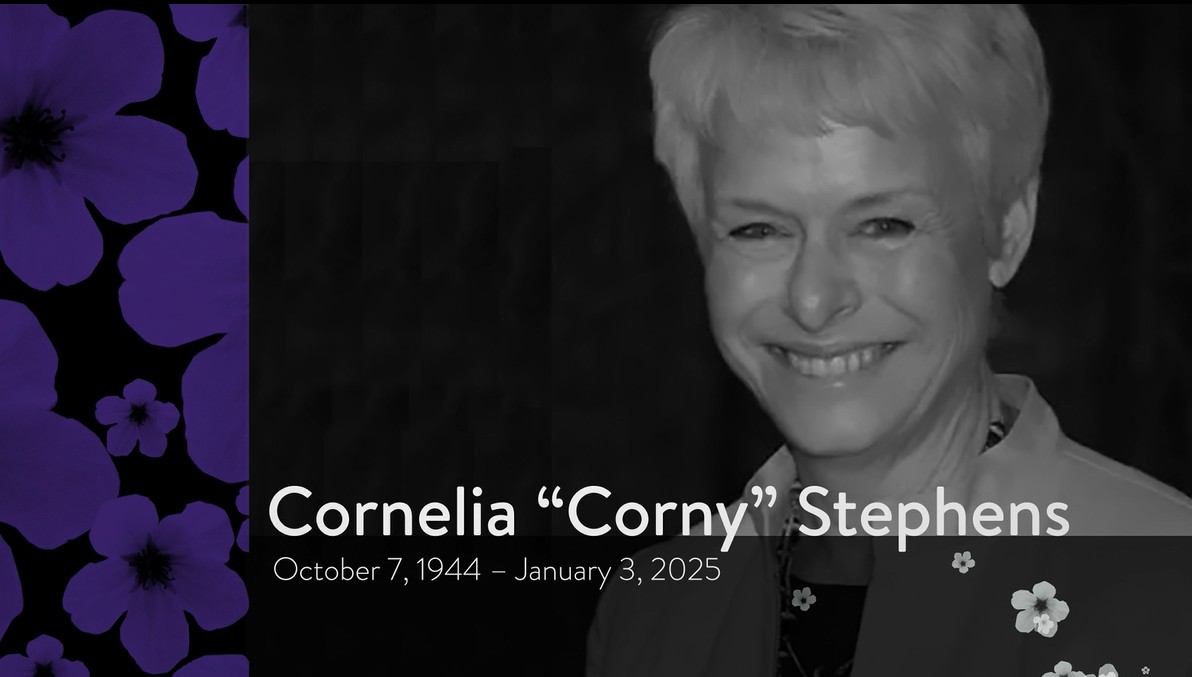
Celebrities passionate about the cause included Multiplatinum Artist & Actor, Phillip Phillips; actor, author and public speaker Frank Stephens; author and public speaker David Egan; six-time Emmy® Award-winner Chuck Todd, and three-time Emmy® Award-winner Autria Godfrey who emceed the gala.
The evening was dedicated to long-time GLOBAL supporter and Frank Stephens’ mother, Cornelia “Corny” Stephens. Corny passed away after a long and courageous fight with Alzheimer’s disease. A video tribute also honored music icon Quincy Jones who passed away last November.

Held at the Marriott Marquis in Washington, DC, the event was attended by GLOBAL awardee alums, Representative Richard Hudson (R-NC) who presented the Quincy Jones Exceptional Advocacy Award to Representative Robert Aderholt, Senator John Hickenlooper (D-CO) who presented the award to Representative Diana DeGette, Representative Rosa DeLauro (D-CT) who presented her scholarship award, and Pete Stauber (R-MN).
Representatives DeGette and Hudson, and Senator Hickenlooper, thrilled the audience when they announced the House and Senate reintroduction of the game-changing bill, the DeOndra Dixon INCLUDE Project Act. The bill will ensure that the trans-NIH Down syndrome funding program called the INCLUDE Project will continue to exist and grow. The bill is a legacy for the memory of GLOBAL Ambassador DeOndra Dixon who is Academy and Grammy Award-winning Jamie Foxx’s younger sister. Jamie Foxx is one of GLOBAL’s international spokespeople. It is also a testament to the dedication of the now-retired Representative Cathy McMorris Rodgers (R-WA).
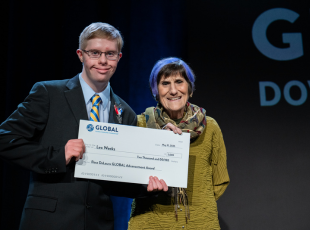


To recognize the transformative leadership of two key Congressional Champions, the Rosa DeLauro GLOBAL Advancement Award with a post-secondary scholarship was provided to Leo Weeks from Herndon, Virginia and the Tom Cole GLOBAL Advancement Award was provided to Gabby Parillon from Lewes, Delaware. Representative Rosa DeLauro was on-hand to personally present the Advancement Award, leaving the audience inspired to do even more for people with Down syndrome and their families.
 With the help of GLOBAL Ambassador Tucker Emry and his family, Erin Book Mullen, co-chairs Natalie Farr Harrison and her husband Guy Harrison, and our amazing Sponsors, the inspirational gala attracted 400 attendees and raised $450,000 for GLOBAL’s life-saving research and medical care. GLOBAL supports over 200 researchers on the Anschutz Medical Campus at the Crnic Institute for Down Syndrome and at the Alzheimer’s and Cognition Center, as well as 2,500 patients from 33 states and 10 countries at the Sie Center for Down Syndrome. For nearly two decades, Down syndrome was one of the least federally funded genetic conditions in the United States.
With the help of GLOBAL Ambassador Tucker Emry and his family, Erin Book Mullen, co-chairs Natalie Farr Harrison and her husband Guy Harrison, and our amazing Sponsors, the inspirational gala attracted 400 attendees and raised $450,000 for GLOBAL’s life-saving research and medical care. GLOBAL supports over 200 researchers on the Anschutz Medical Campus at the Crnic Institute for Down Syndrome and at the Alzheimer’s and Cognition Center, as well as 2,500 patients from 33 states and 10 countries at the Sie Center for Down Syndrome. For nearly two decades, Down syndrome was one of the least federally funded genetic conditions in the United States.

At the end of the evening, Phillip Phillips wowed the audience not only with his beautiful voice but by connecting with fans and bringing self-advocates with Down syndrome on stage while performing an intimate, heartfelt performance of some of his biggest hits including Gone, Gone, Gone and Home, and solo dancer Robert Wallop and inclusive dance team RhythmXpress delighted attendees with dance performances set to Papa’s Got a Brand New Bag and a Hairspray medley.
Additional notables in attendance included GLOBAL Chairman John J. Sie, GLOBAL Ambassadors Sophia Whitten, Charlotte (Charley) Fonfara-LaRose, and Abby Ashbrook; Directors from the NIH Drs. Jay Bhattacharya, Richard Hodes, Gary Gibbons, Alison Cernich, Walter Koroshetz, Michael Chiang, Monica Webb Hooper, Anna Mazzucco and Annica Wayman; Jim Hudson and Heather Sachs from the National Down Syndrome Congress, and executives from Black Down Syndrome Association, Down Syndrome Guild of Dallas, Virginia Down Syndrome Association, 321 Foundation, Down Syndrome Association of Jacksonville, and Down Syndrome Association of Delaware.
To learn more about GLOBAL, visit www.globaldownsyndrome.org.
###
About the Global Down Syndrome Foundation
The Global Down Syndrome Foundation (GLOBAL) is the largest non-profit in the U.S. working to save lives and dramatically improve health outcomes for people with Down syndrome. GLOBAL established the first Down syndrome research institute and supports over 400 scientists and over 2,700 patients with Down syndrome from 33 states and 10 countries. Working closely with Congress and the National Institutes of Health, GLOBAL is the lead advocacy organization in the U.S. for Down syndrome research and care. GLOBAL has a membership of over 110 Down syndrome organizations worldwide, and is part of a network of Affiliates – the Crnic Institute for Down Syndrome, the Sie Center for Down Syndrome, the University of Colorado Alzheimer’s and Cognition Center – all on the Anschutz Medical Campus, and the GLOBAL Adult Down Syndrome Clinic at Denver Health.
GLOBAL’s widely circulated medical publications include Global Medical Care Guidelines for Adults with Down Syndrome, Prenatal & Newborn Down Syndrome Information, and the award-winning magazine Down Syndrome World TM. GLOBAL also organizes the annual AcceptAbility Gala in Washington DC, and the annual Be Beautiful Be Yourself Fashion Show, the largest Down syndrome fundraiser in the world. Visit globaldownsyndrome.org and follow us on social media Facebook, X, Instagram, LinkedIn, and YouTube.
## end ##
Sens. Hickenlooper and Moran and Reps. DeGette and Hudson Reintroduce The DeOndra Dixon INCLUDE Project Act
May 22nd, 2025 by Palmer Brooks
Bipartisan Legislation for Transformative NIH Down Syndrome Research – A Legacy for GLOBAL Ambassador DeOndra Dixon
DENVER – May 22, 2025 — Sens. John Hickenlooper (D-CO) and Jerry Moran (R-KS) and Reps. Diana DeGette (D-CO) and Richard Hudson (R-NC) have reintroduced the DeOndra Dixon INCLUDE Project Act (S.1838/H.R. 3491). Joining as original cosponsors are Sens. Cory Booker (D-NJ) and Markwayne Mullin (R-OK) and Reps. Tom Cole (R-OK), Rosa DeLauro (D-CT), Pete Stauber (R-MN), and Eleanor Holmes Norton (D-DC).
The bill provides statutory authority for the trans-NIH INCLUDE “Investigation of Co-occurring Conditions Across the Lifespan to Understand Down Syndrome” Project. As a result of Global Down Syndrome Foundation’s advocacy, the INCLUDE Project was established in 2018 to investigate the co-occurring conditions that affect those with Down syndrome (e.g. Alzheimer’s, autoimmune disorders) and their quality-of-life needs. It has focused on targeted research on chromosome 21, assembling a large study population of individuals with Down syndrome, and conducting clinical trials that include those with Down syndrome.
“Hundreds of thousands of Americans live with Down syndrome, and yet its research has been underfunded for decades,” says Senator Hickenlooper. “This bill is named for my friend DeOndra Dixon, who lived a full, vibrant life and wanted the same for all people living with Down syndrome. We are determined to get this bill across the finish line for her, and for every American who will benefit from research on many different health conditions.”
“Research, supported by the NIH, has helped improve and extend the lives of individuals with Down syndrome, but there is still more to learn,” says Senator Moran. “This legislation will invest in scientific studies on Down syndrome to help members of the Down syndrome community and their families find answers and solutions for the health challenges they face.”
“Down syndrome, the leading cause of developmental delay in the U.S. and worldwide, was the least funded genetic syndrome at the NIH for decades,” says Representative Diana DeGette. “We have made tremendous strides in new federal investments in Down syndrome research to understand why those living with Down syndrome are so at risk for some diseases, such as Alzheimer’s and autoimmune disorders, and protected from other diseases such as solid tumor cancers. Passage of the DeOndra Dixon INCLUDE Project Act will ensure these successful trans-NIH initiatives continue to make significant scientific advances to improve and extend the lives of people with Down syndrome and millions of other Americans as well.”
“People with Down syndrome enrich our world in many unique ways,” says Representative Hudson. “The DeOndra Dixon INCLUDE Act ensures people with Down syndrome are valued, respected members of society and that NIH is supporting their health, enabling them to live their lives to their full potential – with no barriers or bias or obstacles standing in their way. I am honored to continue and grow research efforts so people with Down syndrome have the long and healthy lives they deserve.”
The legislation is named in honor of the life and legacy of DeOndra Dixon, beloved Global Down Syndrome Foundation (GLOBAL) Ambassador and sister of Academy Award-winning and Grammy Award-winning talent Jamie Foxx. DeOndra was an inspiration behind GLOBAL’s highest honor, the Quincy Jones Exceptional Advocacy Award and she traveled the world promoting awareness and advocacy. She was a talented dancer and musician who performed with her brother at the Grammy Awards.
“We are forever grateful to GLOBAL for creating such purpose for our little sister DeOndra,” says Jamie Foxx. “My sister Deidra and I are so proud of the big difference she made through her advocacy in DC, and now with this bill she will continue to make a difference. There isn’t a day that goes by that we don’t miss her, but today I know she’s dancing up in heaven because this legislation is named after her and will help millions of people with Down syndrome.”
“GLOBAL is truly overwhelmed by the strong bipartisan support for the DeOndra Dixon INCLUDE Project Act that will formally authorize the INCLUDE Project at the NIH and make the project more permanent,” says Michelle Sie Whitten, President and CEO of the Global Down Syndrome Foundation. “We couldn’t have come this far without the leadership of HELP Committee leaders Sens. John Hickenlooper and Markwayne Mullin, House Energy & Commerce leaders Reps. Richard Hudson and Diana DeGette, and our appropriation champions Reps. Tom Cole, Rosa DeLauro and Robert Aderholt. We also owe so much to Dr. Joaquin Espinosa for bringing scientific breakthroughs to the table, to Ambassador DeOndra’s beautiful family, and to our original congressional champions, especially those who have children with Down syndrome such as Reps Cathy McMorris Rodgers, Pete Stauber and Eleanor Holmes Norton.”
GLOBAL had advocated for a trans-National Institutes of Health (NIH) Down syndrome research program since its inception in 2009. In 2017, three GLOBAL leaders , including board member, Frank Stephens, testified at the hallmark House Appropriations Labor, Health and Human Services subcommittee hearing on Down syndrome research. Frank’s testimony went viral that evening with 1 million views and today has over 200 million views. Shortly after the hearing, GLOBAL’s long-time advocacy goal was fulfilled, and the NIH established the INCLUDE Project.
Since the INCLUDE Project was established in 2018, the program has funded 389 unique awards within 21 of the 27 NIH institutes investing $434M. Thirteen of these institutes did not participate in Down syndrome research prior to this program. The INCLUDE Project has also supported the development of the clinical trial infrastructure. Prior to the program, there were only two NIH clinical trials focused on people with Down syndrome. In just seven years, the INCLUDE Project has funded fourteen promising clinical trials with possible immediate or short-term impact for people with Down syndrome.
“DSA of Central Oklahoma is a long-time supporter of the Global Down Syndrome Foundation, and their government advocacy work that resulted in the establishment of the trans-NIH Down syndrome research program called the INCLUDE Project,” says Sarah Soell, Executive Director of the Down Syndrome Association of Central Oklahoma. “We know first-hand from our families that the increased research funding is making a difference. We see real progress in the treatment of the many co-occurring conditions that we see in people with Down syndrome, including autoimmune conditions, regression disorder, sleep apnea, Alzheimer’s and more. Given the nearly twenty years of Down syndrome being the least funded genetic condition at the NIH prior to the INCLUDE Project, it is so important to pass this bill!”
Formally authorizing the INCLUDE Project beyond an annual congressional directive will ensure that people with Down syndrome are not left behind when it comes to participating in clinical trials; it will improve health outcomes and improve their quality of life; and it will send a strong message that our society values and wants to invest in the future of our children and adults with Down syndrome and their families.
GLOBAL urges advocates to contact Congress to urge them to co-sponsor and support passage of the DeOndra Dixon INCLUDE Project Act: https://www.globaldownsyndrome.org/deondra-dixon-include-project-act/
GLOBAL Affiliate, the Crnic Institute for Down Syndrome, has multiple clinical trials specifically designed for persons with Down syndrome testing new therapies for Alzheimer’s disease in Down Syndrome, Down Syndrome Regression Disorder, and autoimmune conditions.
To read about the impactful research that the INCLUDE Project has funded visit the NIH Down Syndrome Coordinating Center Website at: https://includedcc.org/.
###
About Global Down Syndrome Foundation
The Global Down Syndrome Foundation (GLOBAL) is the largest non-profit in the U.S. working to save lives and dramatically improve health outcomes for people with Down syndrome. GLOBAL has donated more than $32 million to establish the first Down syndrome research institute supporting over 400 scientists and over 2,700 patients with Down syndrome from 33 states and 10 countries. Working closely with Congress and the National Institutes of Health, GLOBAL is the lead advocacy organization in the U.S. for Down syndrome research and care. GLOBAL has a membership of over 100 Down syndrome organizations worldwide, and is part of a network of Affiliates – the Crnic Institute for Down Syndrome, the Sie Center for Down Syndrome, and the University of Colorado Alzheimer’s and Cognition Center – all on the Anschutz Medical Campus.
GLOBAL’s widely circulated medical publications include Global Medical Care Guidelines for Adults with Down Syndrome, Prenatal & Newborn Down Syndrome Information and the award-winning magazine Down Syndrome WorldTM . GLOBAL also organizes the annual AcceptAbility Gala in Washington DC, and the annual Be Beautiful Be Yourself Fashion Show, the largest Down syndrome fundraiser in the world. Visit globaldownsyndrome.org and follow us on social media (Facebook & Twitter: @GDSFoundation, Instagram: @globaldownsyndrome).
## end ##
United Coalition for Down Syndrome Condemns the Rise in the Use of the R-word
May 13th, 2025 by admin
Freedom of Speech & Protecting Vulnerable Communities Are Not Mutually Exclusive

CINCINNATI, DENVER, HOFFMAN ESTATES, Ill., WASHINGTON, D.C., WOBURN, Mass. (May 1, 2025) – Today, the United Coalition for Down Syndrome is speaking out against the alarming resurgence of the “R-word” in public discourse. At the same time, we are calling on individuals and organizations to take a stand, by pledging not to use this harmful slur.
Numerous media outlets have reported a sharp increase in the word’s usage across television, radio, podcasts, social media, and the internet. A recent study examining social media in January 2025 revealed a staggering 207.5% rise in posts containing the R-word on X alone – totaling 312,642 instances.
Shockingly, there are some who believe its use is a “great cultural victory.”
We firmly reject that notion. The R-word is not a cultural triumph – it is a tool of marginalization. It dehumanizes people with Down syndrome and other disabilities and can contribute to mental distress and long-lasting harm. This type of language is rooted in the same prejudice that, for decades, led to people with Down syndrome and other intellectual and developmental disabilities being placed in cruel and inhumane institutions such as Willowbrook, NY – a practice that continued well into the early 1990s.
“Being compared to people like me should be considered a badge of honor. No one overcomes more than we do and still loves life so much. And yet here we are in 2025 with some of the most influential people in our country, like naughty little boys with their first curse word, reviving the use of the R-word just to gain attention and, meanwhile, opening the floodgates to its popular use. I appreciate the United Coalition for Down Syndrome standing up for what is right, and I hope this goes a long way in educating people that using the R-word is like a little dagger jabbing at our dignity as human beings,” says Frank Stephens, a Special Olympics Global Messenger associated with the “End the Word” campaign, and Global Down Syndrome Foundation board member.
The United Coalition for Down Syndrome embraces and is grateful for the freedom of speech that defines our nation. But using that freedom to perpetuate a derogatory term aimed at one of society’s most vulnerable populations is not bold – it’s cowardly. Not everyone with an intellectual and developmental disability can push back against such slurs or exact any meaningful social cost on those who use them.
We believe that the overwhelming majority of Americans want to do the right thing. The United Coalition for Down Syndrome urges everyone to make the conscious choice to leave this word behind. In exercising our freedom of speech, let’s also choose compassion, dignity, and respect. These are lives worth celebrating – and our language should reflect that truth.
Related Resources:
GiGi’s Playhouse Down Syndrome Achievement Centers: Community Page; GiGi’s Message on the R Word
Global Down Syndrome Foundation: Words Can Hurt
National Down Syndrome Congress: NDSC condemns the use of the “R-word” and calls for respectful language
National Down Syndrome Society: Preferred Language Guide; R-Word TikTok Video
Special Olympics: Why the R-word is the R-Slur; Increase Usage of the R-word on Social Media
About the United Coalition for Down Syndrome
The United Coalition for Down Syndrome (UCDS) is a coalition of national Down syndrome organizations seeking to facilitate collective action and speak with a unified voice concerning critical issues that impact the Down syndrome community in the United States. UCDS is comprised of the following national organizations: GiGi’s Playhouse Achievement Centers, Global Down Syndrome Foundation, LuMind IDSC, National Down Syndrome Congress, and National Down Syndrome Society. All of our organizations remain steadfastly non-partisan, focusing solely on the well-being of individuals with Down syndrome and their families.
GLOBAL Members Taking a Stand:
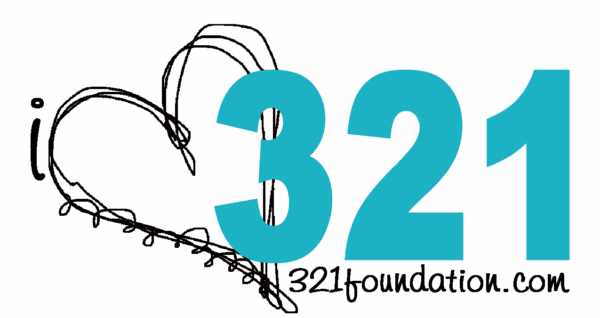
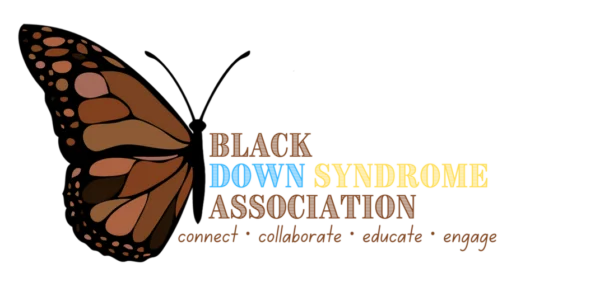





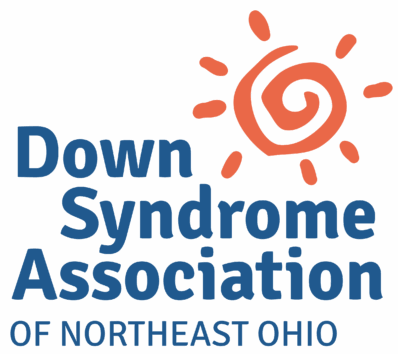
![]()



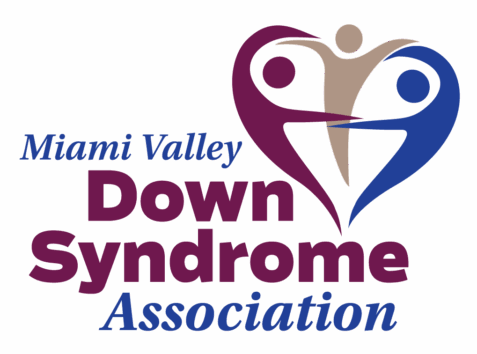

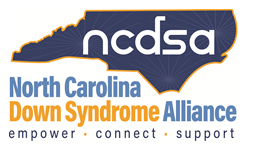



Contacts:
Anca Elena Call
Global Down Syndrome Foundation
acall@globaldownsyndrome.org
C: (720) 320-3832
Jim Hudson
National Down Syndrome Congress
jim@ndsccenter.org
C: (513) 400-6563
Michelle Sagan
National Down Syndrome Society
msagan@ndss.org
C: (301) 728-0447
Kris Meadows
GiGi’s Playhouse
Kmeadows@gigisplayhouse.org
C: (815) 739-7656
Kate O’Neill
LuMind IDSC
koneill@lumindidsc.org
C: (508) 344-4932
MAY 21: Local Talent with Down Syndrome, Members of Congress, and Multiplatinum Artist Phillip Phillips Headline AcceptAbility Gala and Highlight NIH Research Needs
May 9th, 2025 by admin
Event Honors Rep. DeGette, Rep. Aderholt, and Tucker Emry & Features Chuck Todd, and Performers with Down Syndrome
WHAT 
The Global Down Syndrome Foundation (GLOBAL) is honoring Congresswoman Diana DeGette (D-CO) and Congressman Robert Aderholt (R-AL), who will receive GLOBAL’s highest honor,the Quincy Jones Exceptional Advocacy Awards, for their work in support for those with Down syndrome, during its annual AcceptAbility Gala. GLOBAL Ambassador Tucker Emry, an actor and self-advocate from Baltimore, will also be recognized. The gala is an inspiring fundraiser that features a dance performance by Annapolis’ Robert Wallop and other DC-area dancers from the inclusive dance team, RhythmXpress, as well as a performance by Multiplatinum Artist and Actor Phillip Phillips. This year’s gala is honoring the memory of the beloved and long-time GLOBAL supporter, Cornelia Stephens.
WHEN
Wednesday, May 21, 2025; 6:00 p.m. – Reception/Red Carpet; 7:00 p.m. – Dinner, live auction and special performances by Phillip Phillips and local talent with Down syndrome and other intellectual disabilities.
WHO
- Honoree Cong. Robert Aderholt (R-AL)
- Honoree Cong. Diana DeGette (D-CO)
- 2025 GLOBAL Ambassador Tucker Emry, Actor and Self-Advocate from Baltimore
- Congressional Host Committee Members: Sen. Cory Booker, Cong. Katherine Clark, Cong. Tom Cole, Sen. Steve Daines, Cong. Rosa DeLauro, Cong. Lois Frankel, Sen. John Hickenlooper, Cong. Richard Hudson (presenting), Sen. Jerry Moran, Cong. Eleanor Holmes Norton, Cong. Pete Sessions, Cong. Pete Stauber
- Phillip Phillips, Multiplatinum Artist and Actor
- Chuck Todd, NBC News’ chief political analyst, Event Co-Emcee
- Autria Godfrey, former ABC7 News anchor, Event Co-Emcee
- Robert Wallop, Soloist Dancer and Self-Advocate, Annapolis, MD
- RhythmXpress, Integrated Dance Team, Annapolis, MD
- Michelle Sie Whitten, President & CEO, Global Down Syndrome Foundation
- Frank Stephens, GLOBAL Board Member, GLOBAL Ambassador, Self-Advocate and Actor, Fairfax, VA
- David Egan, Quincy Jones Awardee, Gala Event Committee, Self-Advocate and Author, Vienna, VA
- Natalie Farr Harrison, SVP, Government Relations, Avoq, and Guy Harrison, Partner, OnMessage, of Alexandria, VA, Gala Board Co-Chairs
WHERE
Marriott Marquis Washington, DC
901 Massachusetts Ave, NW
Washington, DC 20001
WHY
GLOBAL’s annual AcceptAbility Gala brings together policymakers from both sides of the aisle, key scientists from NIH, philanthropists, corporate sponsors, and the Down syndrome community. Down syndrome is the most frequent chromosomal condition, affecting over 400,000 Americans. With GLOBAL’s leadership bringing together multiple stakeholders, the NIH Down syndrome research and medical care budget has increased by $418 million over the last seven years. The AcceptAbility Gala is an opportunity to celebrate major new federal research funding increases after years of being one of the least funded genetic conditions and to educate Congress and the community about the transformative DeOndra Dixon INCLUDE Project Act of 2024 that will elongate life and improve health outcomes for people with Down syndrome.
HOW
To cover the event or receive photos, contact Shawn Flaherty at 703-554-3609. For more information, visit www.globaldownsyndrome.org.
Medicaid Is A Lifeline for Individuals with Down Syndrome
May 6th, 2025 by Palmer Brooks
Global Down Syndrome Foundation – Policy Statement

DENVER (May 6, 2025) – Today the Global Down Syndrome Foundation published its Policy Statement on how potential changes to Medicaid can affect individuals with Down syndrome and their families and issued a call to action.
Congress and the Administration are considering changes to the Medicaid program, a shared federal-state program that provides health insurance coverage, medical care and services for low-income Americans, as well as Americans with disabilities, including those with Down syndrome. While income eligibility limits vary by state, individuals with incomes from $967/month to $2,901/month can qualify for Medicaid coverage and services.
As policymakers debate and consider changes to this vital program, the Global Down Syndrome Foundation (GLOBAL) urges Congress to safeguard and strengthen the Medicaid program, recognizing its indispensable role in supporting individuals with Down syndrome and others with intellectual and developmental disabilities.
Background
Down syndrome is a chromosomal condition caused by having an extra copy of chromosome 21. It is the most common chromosomal condition diagnosed in the U.S., affecting about 6,000 babies born every year. Americans with Down syndrome often have complex medical needs. While it is important to note that people with Down syndrome are genetically protected from certain diseases such as solid tumor cancers and certain types of heart attack and stroke, unfortunately they are also more at risk for other diseases. For example, they are at a higher risk for diseases such as Alzheimer’s disease, leukemias, autoimmune diseases such as hypothyroidism and alopecia areata, congenital heart disease, and sleep apnea.

Medicaid is the primary source of health coverage for individuals with Down syndrome, providing critical medical, long-term services, and home and community-based support. A 2023 study published in JAMA Health Forum, Medicaid Enrollment and Service Use Among Adults With Down Syndrome, which studied enrollment patterns, identified 123,024 with Down syndrome, over 25% of the Down syndrome population, enrolled in Medicaid between 2011 and 2019. While Medicaid coverage eligibility is based on household income relative to the federal poverty level, people with disabilities such as Down syndrome can qualify for Medicaid coverage through the Social Security Administration’s Supplemental Security Income (SSI) benefits program. To qualify, individuals must have a medically determinable physical or mental impairment that prevents substantial gainful activity and is expected to last at least 12 months or result in death, and meet certain monthly income and asset limits.
The Importance of Medicaid Coverage
Medicaid provides coverage that supports the unique needs and health challenges facing people with Down syndrome, including:
- Home and Community-Based Services (HCBS): Supports independent living and prevents unnecessary institutionalization.
- Specialty Medical Care: Covers treatment for co-occurring conditions common among people with Down syndrome, including congenital heart defects, thyroid disease, hearing loss, vision impairment, sleep apnea, gastrointestinal conditions, and autoimmune disorders.
- Therapy Services: Funds physical, occupational, and speech therapies that promote functional independence and quality of life.
- Personal Care Support: Assists with activities of daily living, including bathing, dressing, and eating.
- Behavioral Health Services: Supports mental health care and behavioral interventions for individuals with intellectual and developmental disabilities.
- Medical Equipment and Supplies: Provides access to durable medical equipment like hearing aids, orthotics, wheelchairs, and communication devices.
A Call To Action
GLOBAL supports efforts to improve the Medicaid program. However, we have deep concerns regarding proposals under consideration to significantly reduce federal funding, impose block grants that would diminish funding, and enact onerous eligibility restrictions that would result in people with Down syndrome being denied coverage or reducing current coverage for essential services. Protecting Medicaid is not just fiscally responsible — it is a moral obligation to ensure that individuals with Down syndrome and others with IDD can lead full, meaningful lives with the care and support they deserve. GLOBAL urges the Congress and Administration to protect Medicaid to ensure that people with Down syndrome and other vulnerable populations continue to have access to quality and affordable healthcare services under Medicaid.

About Global Down Syndrome Foundation
The Global Down Syndrome Foundation (GLOBAL) is the largest non-profit in the U.S. working to save lives and dramatically improve health outcomes for people with Down syndrome. GLOBAL established the first Down syndrome research institute and supports over 400 scientists and over 2,700 patients with Down syndrome from 33 states and 10 countries. Working closely with Congress and the National Institutes of Health, GLOBAL is the lead advocacy organization in the U.S. for Down syndrome research and care. GLOBAL has a membership of over 110 Down syndrome organizations worldwide, and is part of a network of Affiliates – the Crnic Institute for Down Syndrome, the Sie Center for Down Syndrome, the University of Colorado Alzheimer’s and Cognition Center – all on the Anschutz Medical Campus, and the GLOBAL Adult Down Syndrome Clinic at Denver Health.
GLOBAL’s widely circulated medical publications include Global Medical Care Guidelines for Adults with Down Syndrome, Prenatal & Newborn Down Syndrome Information, and the award-winning magazine Down Syndrome World TM. GLOBAL also organizes the annual AcceptAbility Gala in Washington DC, and the annual Be Beautiful Be Yourself Fashion Show, the largest Down syndrome fundraiser in the world. Visit globaldownsyndrome.org and follow us on social media Facebook, X, Instagram, and LinkedIn.
Contact:
Anca Elena Call
acall@globaldownsyndrome.org
C: (720) 320-3832
Victoria Esposito
Victoria.consultant@globaldownsyndrome.org
C: (714)728-0663
Bipartisan Congressional Members & Celebrities to Champion Down Syndrome Research in DC
April 3rd, 2025 by Palmer Brooks
Representatives Robert Aderholt and Diana DeGette to Receive GLOBAL’s Highest Honor, Celebrity TV Journalists Chuck Todd & Autria Godfrey to Emcee
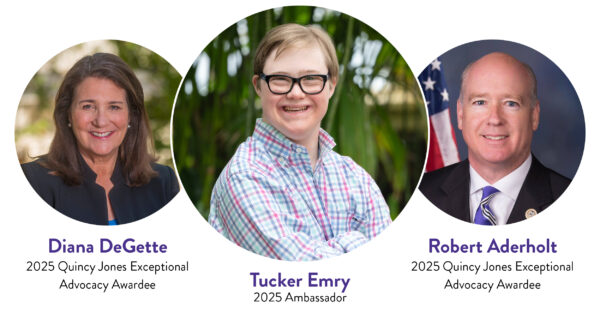
DENVER, CO ( April 3, 2025) – Today, the Global Down Syndrome Foundation (GLOBAL) announced Representatives Robert Aderholt (R-AL) and Diana DeGette (D-CO) will receive GLOBAL’s highest honor, the Quincy Jones Exceptional Advocacy Award, at their annual AcceptAbility Gala on Wednesday, May 21st at the Marriott Marquis Washington, DC. Each year, the awards are bestowed upon Members of Congress from both sides of the aisle who have gone above and beyond to support GLOBAL’s mission to elongate life and improve health outcomes for people with Down syndrome.

Six-time Emmy® Award-winner and NBC News’ chief political analyst Chuck Todd will co-emcee the gala. Todd was the former moderator of NBC’s flagship Sunday program Meet the Press from 2014 to 2023, and is currently the host of The Chuck ToddCast, a near-daily podcast offering in-depth interviews with political figures, experts, and thought leaders. Three-time Emmy Award-winning former WJLA ABC News anchor Autria Godfrey will co-host alongside Todd and bring her Good Morning Washington energy to the event. Multiplatinum artist and actor Phillip Phillips, soloist and member of the Maryland-based RhythmXpress dance team Robert Wallop, and GLOBAL Ambassador and actor from Baltimore Tucker Emry will headline this inspirational event. Tickets, Tables and Sponsorships are now available here.
The evening also features Congressional Hosts including Senators Cory Booker, Steve Daines, John Hickenlooper, and Jerry Moran; and Representatives Katherine Clark, Tom Cole, Rosa DeLauro, Lois Frankel, Richard Hudson, Eleanor Holmes Norton, Pete Sessions, and Pete Stauber.
In addition, each year at the gala, two students with Down syndrome are provided post-secondary GLOBAL Advancement Awards named in honor of Representatives Tom Cole (R-OK) and Rosa DeLauro (D-CT). The winners will be announced on May 21st at the AcceptAbility Gala, and it is anticipated that the representatives will present the awards at the event.
GLOBAL’s annual AcceptAbility Gala brings together policymakers from both sides of the aisle, key scientists from the National Institutes of Health (NIH), and the Down syndrome community. Each year, the gala recognizes two Members of Congress with their highest honor, the Quincy Jones Exceptional Advocacy Award. Past recipients include Representatives Tom Cole, Rosa DeLauro, Pete Sessions, Eleanor Holmes Norton, Cathy McMorris Rodgers, Katherine Clark, Pete Stauber, Lois Frankel, and Richard Hudson; and Senators John Hickenlooper, Jerry Moran, Steve Daines, and Tom Harkin.
Other notables include AcceptAbility Gala Board Co-chairs Natalie Farr Harrison, Senior Vice President of Government Relations at Avoq, and her husband, Guy Harrison, a Partner at OnMessage Inc.
The AcceptAbility Gala Board consists of business and government advocacy leaders as well as leaders in the Down syndrome community. In addition to the Harrisons, the board includes Jan Adams, Founder & CEO JMA Solutions; John Ashbrook, Founding Partner, Cavalry LLC; Amy Best Weiss, Executive VP, Global Government Affairs, American Express; Kevin Brennan, Principal, Bluebird Strategies; Emilie Eager, Director of Business Development, Julie Parker Communications; David Egan, Quincy Jones Awardee, self-advocate and author, from Vienna, VA; Felicia Emry, Esq., Life Skills Program Coordinator and Client Care Liaison, Heaven on Earth NOW; Erin Book Mullen, Principal, Williams & Jensen, PLLC; Matthew Perin, Head of Government Relations and Regulatory Affairs, Kroger; Cliff Riccio, Senior Vice President and Chief, Government Relations, NCTA; Julie Riccio, Director of Regulatory Affairs and Public Policy, PwC; Frank Stephens, GLOBAL board member, GLOBAL Ambassador, self-advocate and actor, from Fairfax, VA; Richard Waysdorf, Legal Consultant, Global Down Syndrome Foundation; and Michelle Sie Whitten, President & CEO, Global Down Syndrome Foundation.
The AcceptAbility Gala supports the Global Down Syndrome Foundation, funding life-changing government advocacy, research, and lifesaving medical care for children and adults with Down syndrome. Down syndrome is the most frequent chromosomal condition, affecting an estimated 400,000 Americans, but it has been one of the least-funded genetic condition by NIH.
With GLOBAL’s leadership bringing together multiple stakeholders, the NIH Down syndrome research and medical care budget has increased by $440 million over the last seven years. The AcceptAbility Gala is an opportunity to celebrate major new federal research funding increases after years of being one of the least funded genetic conditions and to educate Congress and the community about the transformative DeOndra Dixon INCLUDE Project Act that ensures funding that will elongate life and improve health outcomes for people with Down syndrome.
The AcceptAbility Gala starts at 6:00 p.m. with a reception and red carpet followed by dinner, a live auction, and performances by local dancers with Down syndrome and Multiplatinum artist and actor Phillip Phillips. Tickets start at $700 and can be purchased online at www.globaldownsyndrome.org. To cover the event or receive photos or b-roll, contact Shawn Flaherty at 703-554-3609. For more information, visit www.globaldownsyndrome.org.
###
About the Global Down Syndrome Foundation
The Global Down Syndrome Foundation (GLOBAL) is the largest non-profit in the U.S. working to save lives and dramatically improve health outcomes for people with Down syndrome. GLOBAL established the first Down syndrome research institute and supports over 400 scientists and over 2,700 patients with Down syndrome from 33 states and 10 countries. Working closely with Congress and the National Institutes of Health, GLOBAL is the lead advocacy organization in the U.S. for Down syndrome research and care. GLOBAL has a membership of over 110 Down syndrome organizations worldwide, and is part of a network of Affiliates – the Crnic Institute for Down Syndrome, the Sie Center for Down Syndrome, the University of Colorado Alzheimer’s and Cognition Center – all on the Anschutz Medical Campus, and the GLOBAL Adult Down Syndrome Clinic at Denver Health.
GLOBAL’s widely circulated medical publications include Global Medical Care Guidelines for Adults with Down Syndrome, Prenatal & Newborn Down Syndrome Information, and the award-winning magazine Down Syndrome World TM. GLOBAL also organizes the annual AcceptAbility Gala in Washington DC, and the annual Be Beautiful Be Yourself Fashion Show, the largest Down syndrome fundraiser in the world. Visit globaldownsyndrome.org and follow us on social media Facebook, X, Instagram, LinkedIn, and YouTube.
Global Down Syndrome Foundation Celebrates World Down Syndrome Day in Denver, NYC, Australia, Uganda & Italy
March 20th, 2025 by admin
GLOBAL’s WDSD Campaign Aims to Raise $25,000 for Life-Saving & Transformative Research & Medical Care
DONATE between now and MARCH 31st to help us reach our goal!
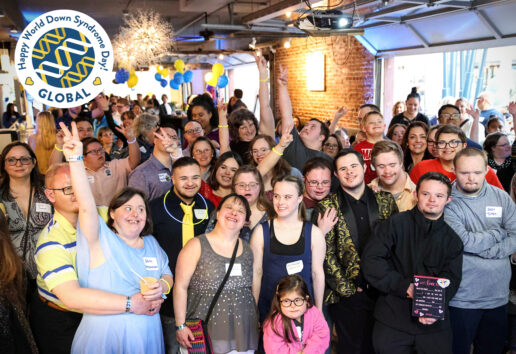
DENVER, SYDNEY, KAMPALA, NYC, GENOVA, March 20, 2025 – Today, the Global Down Syndrome Foundation (GLOBAL) announced their World Down Syndrome Day celebrations in Denver, New York City, Australia, Uganda, and Italy. The foundation, which provides evidence-based, free medical care guidelines for children and adults with Down syndrome, aims to raise $25,000 for their World Down Syndrome Campaign. One hundred percent of the proceeds go to life-saving and transformative research and medical care for patients with Down syndrome from 33 states and 10 countries.
As World Down Syndrome Day approaches on March 21st (signifying that people with Down syndrome have 3 copies of chromosome 21), GLOBAL is gearing up for several celebrations and impactful initiatives around the world:
 Denver, USA – World Down Syndrome Day EPIC Dance Party
Denver, USA – World Down Syndrome Day EPIC Dance Party
- Over 200 people and local celebrities have already signed up for GLOBAL’s Friday, March 21st event at the fabulous Cherry Creek Shopping Center with additional sponsorships from Kona Grill, Developmental Pathways, and Ricki & Dave Rest; Register and donate today HERE
- Thanks to GLOBAL’s amazing friends at Kroenke Sports Charities who are lighting up Ball Arena blue & yellow in the morning
Sydney, Australia – Down Syndrome Symposium Australia
- Featuring GLOBAL/Crnic Institute Director Dr. Joaquín Espinosa and GLOBAL Adult Guideline Author Dr. Dennis McGuire
- Supported by GLOBAL, Down Syndrome Institute, Siblings Australia, The Hon. Dr. Mike Freelander MP and more
- Saturday March 22nd – Sunday March 23rd at Wesley Conference Centre, 220 Pitt Street, Syndey CBP 10:00 AM – 5:00 PM – FREE & Open to the Public!
New York City, USA – United Nations Conference
- Featuring GLOBAL/Crnic Institute Researcher Deborah Fidler, PhD, Professor of Human Development and Family Studies at Colorado State University; Other speakers include Tonye Faloughi-Ekezie, GiGi Gianni and Nancy Gianni, Misty Coy Snyder
- Thursday, March 20th 11:30 – 12:45 PM, General Assembly Building Conference Room 3 – FREE & Open to the Public

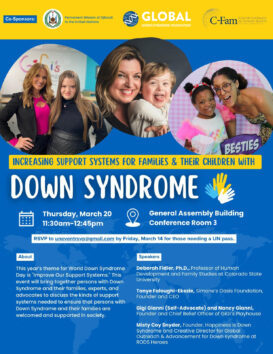
Genoa, Italy – “No Decision Without US” CoorDown Video
- Featuring GLOBAL International Spokesperson Caterina Scorsone & talented Self-Advocates
- GLOBAL is proud to support this important video created by CoorDown in Italy
Denver, USA –Important World Down Syndrome Day Video from GLOBAL
- Featuring Self-Advocates from Around the World
Kampala, Uganda – World Down Syndrome Day Awareness Events
- Featuring an Awareness March in the city, an exhibit for people with DS to share their skills (dance, pottery, baking, arts), and a Resource fair to support families
- GLOBAL and the Global Livingston Institute are working with local Down syndrome and intellectual disability NGOs to organize these fun and inspiring events


“We are so honored to be a part of World Down Syndrome Day initiatives in Denver, NYC, Australia, Italy, and Uganda this year,” says GLOBAL President & CEO Michelle Sie Whitten. “We are now actively working in 10 countries translating and distributing our Prenatal & Newborn Pamphlet, GLOBAL Adult Guideline, and other important resources at no cost to hundreds of thousands of people with Down syndrome and their families. We could not do this without our wonderful in-country collaborators, the leaders on our GLOBAL Membership Advisory Board, and our affiliates, families and champions. Everyone at GLOBAL works so hard, and it is lovely to have a day where everyone can just celebrate our progress and the awesome people with Down syndrome we serve!”
World Down Syndrome Day falls on March 21st or “3-21” signifying the fact that people with Down syndrome are born with 3 (three) copies of chromosome 21 instead of 2 (two). World Down Syndrome Day was promulgated by the United Nations in 2012 and is celebrated in 190 countries.
To learn more about the Global Down Syndrome Foundation and World Down Syndrome Day, visit www.globaldownsyndrome.org/world-down-syndrome-day-month.
###
About the Global Down Syndrome Foundation
The Global Down Syndrome Foundation (GLOBAL) is the largest non-profit in the U.S. working to save lives and dramatically improve health outcomes for people with Down syndrome. GLOBAL established the first Down syndrome research institute and supports over 400 scientists and over 2,700 patients with Down syndrome from 33 states and 10 countries. Working closely with Congress and the National Institutes of Health, GLOBAL is the lead advocacy organization in the U.S. for Down syndrome research and care. GLOBAL has a membership of over 110 Down syndrome organizations worldwide, and is part of a network of Affiliates – the Crnic Institute for Down Syndrome, the Sie Center for Down Syndrome, the University of Colorado Alzheimer’s and Cognition Center – all on the Anschutz Medical Campus, and the GLOBAL Adult Down Syndrome Clinic at Denver Health.
GLOBAL’s widely circulated medical publications include Global Medical Care Guidelines for Adults with Down Syndrome, Prenatal & Newborn Down Syndrome Information, and the award-winning magazine Down Syndrome World TM. GLOBAL also organizes the annual AcceptAbility Gala in Washington DC, and the annual Be Beautiful Be Yourself Fashion Show, the largest Down syndrome fundraiser in the world.
Visit globaldownsyndrome.org and follow us on social media (Facebook & Twitter: @GDSFoundation, Instagram: @globaldownsyndrome, YouTube: @GlobaldownsyndromeOrg, LinkedIn: @global-down-syndrome-foundation).
Join Headliners Phillip Phillips & Tucker Emry at GLOBAL’S AcceptAbility Gala in DC!
February 6th, 2025 by Palmer Brooks
Co-Chairs Natalie Farr Harrison & Guy Harrison Promise a Magical Evening Including Local Dancers with Down Syndrome

DENVER– February 6, 2025 – Today, the Global Down Syndrome Foundation (GLOBAL) announced Multiplatinum Artist and Actor Phillip Phillips and GLOBAL Ambassador and actor Tucker Emry will headline their annual AcceptAbility Gala at the Marriot Marquis Washington, DC on Wednesday, May 21, 2025. Tickets, Tables and Sponsorships are now available here.
Since releasing his five-times-platinum debut single “Home,” Phillip Phillips has released three chart-topping albums and taken his expansive brand of earthy, guitar-fueled rock to stages across the globe. In 2020, Phillips joined GLOBAL’s Be Beautiful Be Yourself Fashion Show and performed a heartfelt tribute in honor of DeOndra Dixon with a beautiful rendition of “Gone, Gone, Gone.” Tucker Emry is a role model in the Down syndrome community attending The Harbour School in Maryland and participating in his Young Life youth group and Performing Arts Academy where he is honing his acting skills. He has appeared as Puck in “A Midsummer Night’s Dream” and the White Rabbit in “Alice in Wonderland,” among other roles.
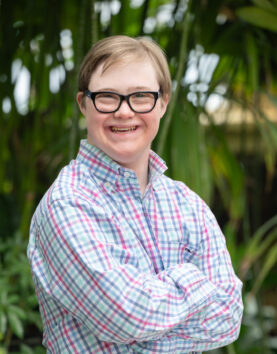

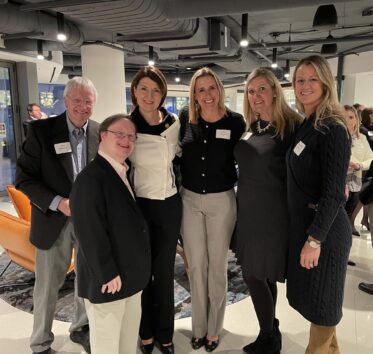
Natalie Farr Harrison and her husband Guy Harrison are long-time AcceptAbility Gala Board Members and are thrilled to Co-Chair this event. “We have so many friends who have children with Down syndrome so GLOBAL’s life-changing research and medical care advocacy is near and dear to our hearts,” says Natalie. “Guy and I have been in DC for over 20 years, and I can honestly say the AcceptAbility Gala is the most inspirational and magical fundraiser we’ve ever attended. We can’t wait for more people to know about it!” Natalie is a Senior Vice President of Government Relations at Avoq. Guy is a Partner at OnMessage Inc.

“I am so grateful to be able to show Members of Congress and our friends at NIH how great my team and I are at dancing!” says Robert Wallop, soloist and member of the RhythmXpress dance team. Robert is the three-time USA Dance National Champion for Pro/Am rhythm and smooth at the bronze level. In 2017, he was featured on the hit show So You Think You Can Dance.
GLOBAL’s annual AcceptAbility Gala brings together policymakers from both sides of the aisle, key scientists from the National Institutes of Health (NIH), and the Down syndrome community. Each year, the gala recognizes two Members of Congress with their highest honor, the Quincy Jones Exceptional Advocacy Award. Past recipients include Representatives Tom Cole, Rosa DeLauro, Pete Sessions, Eleanor Holmes Norton, Cathy McMorris Rodgers, Katherine Clark, Pete Stauber, Lois Frankel, and Richard Hudson; and Senators John Hickenlooper, Jerry Moran, Steve Daines, and Tom Harkin.


The AcceptAbility Gala Board consists of business and government advocacy leaders as well as leaders in the Down syndrome community. In addition to Natalie and Guy the board includes Jan Adams, Founder & CEO JMA Solutions; John Ashbrook, Founding Partner, Cavalry LLC; Amy Best Weiss, Executive VP, Global Government Affairs, American Express; Kevin Brennan, Principal, Bluebird Strategies; Emilie Eager, Director of Business Development, Julie Parker Communications; David Egan, Quincy Jones Awardee, self-advocate and author, from Vienna, VA; Felicia Emry, Esq., Life Skills Program Coordinator and Client Care Liaison, Heaven on Earth NOW; Erin Book Mullen, Principal, Williams & Jensen, PLLC; Matthew Perin, Head of Government Relations and Regulatory Affairs, Kroger; Cliff Riccio, Senior Vice President & Chief, Government Relations, NCTA; Julie Riccio, Director of Regulatory Affairs and Public Policy, PwC; Frank Stephens, GLOBAL board member, GLOBAL Ambassador, self-advocate and actor, from Fairfax, VA; Richard Waysdorf, Legal Consultant, Global Down Syndrome Foundation; and Michelle Sie Whitten, President & CEO, Global Down Syndrome Foundation.
The AcceptAbility Gala supports the Global Down Syndrome Foundation, funding life-changing government advocacy, research, and lifesaving medical care for children and adults with Down syndrome. Down syndrome is the most frequent chromosomal condition, affecting an estimated 400,000 Americans, but it has been one of the least-funded genetic condition by NIH.
With GLOBAL’s leadership bringing together multiple stakeholders, the NIH Down syndrome research and medical care budget has increased by $440 million over the last seven years. The AcceptAbility Gala is an opportunity to celebrate major new federal research funding increases after years of being one of the least funded genetic conditions and to educate Congress and the community about the transformative DeOndra Dixon INCLUDE Project Act that ensures we continue to elongate life and improve health outcomes for people with Down syndrome.
The AcceptAbility Gala starts at 6:00 p.m. with a reception and red carpet followed by dinner, a live auction, and performances by local dancers with Down syndrome and Multiplatinum artist and actor Phillip Phillips. Tickets start at $700 and can be purchased online at www.globaldownsyndrome.org. To cover the event or receive photos or b-roll, contact Shawn Flaherty at 703-554-3609. For more information, visit www.globaldownsyndrome.org.
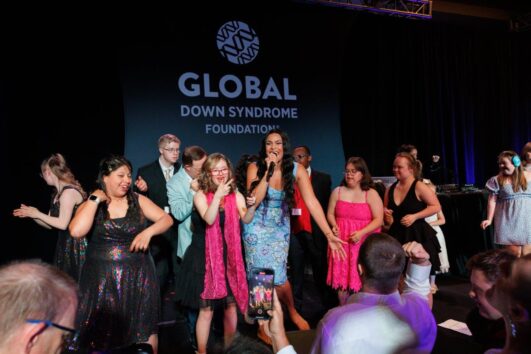
###
About the Global Down Syndrome Foundation
The Global Down Syndrome Foundation (GLOBAL) is the largest non-profit in the U.S. working to save lives and dramatically improve health outcomes for people with Down syndrome. GLOBAL established the first Down syndrome research institute and supports over 400 scientists and over 2,700 patients with Down syndrome from 33 states and 10 countries. Working closely with Congress and the National Institutes of Health, GLOBAL is the lead advocacy organization in the U.S. for Down syndrome research and care. GLOBAL has a membership of over 110 Down syndrome organizations worldwide, and is part of a network of Affiliates – the Crnic Institute for Down Syndrome, the Sie Center for Down Syndrome, the University of Colorado Alzheimer’s and Cognition Center – all on the Anschutz Medical Campus, and the GLOBAL Adult Down Syndrome Clinic at Denver Health.
GLOBAL’s widely circulated medical publications include Global Medical Care Guidelines for Adults with Down Syndrome, Prenatal & Newborn Down Syndrome Information, and the award-winning magazine Down Syndrome World TM. GLOBAL also organizes the annual AcceptAbility Gala in Washington DC, and the annual Be Beautiful Be Yourself Fashion Show, the largest Down syndrome fundraiser in the world. Visit globaldownsyndrome.org and follow us on social media Facebook, X, Instagram, and LinkedIn.
Crnic Institute Receives $2.7 Million Grant for an International Study of Down Syndrome
November 26th, 2024 by admin
The Landmark NIH Grant Will Fund a Network of Clinical Research Sites Across Latin America to Harmonize Data and Understand Clinical Characteristics and Potential Differences in Care

AURORA, Colo. November 26, 2024 – A landmark $2.7 million grant from the National Institutes of Health (NIH) INCLUDE Project will support the Human Trisome Project – Latin America Network, a network of research and medical care sites across the United States and in Latin America to investigate the clinical characteristics and to identify distinguishing health issues or treatments for Latinos with Down syndrome. According to the U.S. Census Bureau’s American Community Survey, Hispanic and Latino Americans make up 19.1% of the U.S. population and are the nation’s fastest-growing ethnic group.
This innovative study will be led by scientists at the Linda Crnic Institute for Down Syndrome at the University of Colorado Anschutz Medical Campus and collaborators at Colorado State University. It is part of a larger effort launched by NIH INCLUDE Project known as the Down Syndrome Cohort Development Program (DS-CDP) that aims to study people with Down syndrome from birth to adulthood with unprecedented detail.

“We are thrilled that the NIH selected the Human Trisome Project to develop an international component for their INCLUDE Project,” says Joaquín Espinosa, PhD, executive director of the Crnic Institute and lead principal investigator. “Although Latinos are the fastest growing segment of the population with Down syndrome in the U.S., little is known about the potential differences in their developmental and clinical profiles. With this generous grant we will complete a comprehensive annotation of demographic information, social determinants of health, co-occurring conditions, and lifestyle factors.”
In the first two years of the study, multiple sites across the U.S. and Latin America will develop a shared protocol, including clinical characterization and collection of biospecimens, with the recruitment slated to begin in 2025. The Latin American network builds on the Human Trisome Project, a large cohort study of people with Down syndrome led by the Crnic Institute. The initiative will establish primary sites in the U.S., Mexico, Colombia, Brazil, Argentina, and Chile, while conducting feasibility studies in Venezuela and Bolivia.
“Our research protocol will be deployed in multiple languages and with appropriate cultural adaptations,” explains Deborah Fidler, PhD, professor of human development and family studies at Colorado State University and principal investigator of the study. “We are eager to learn about the lives of people with Down syndrome in Latin American countries, and we believe these discoveries will lead to new insights about promoting well-being in this population across cultural contexts.”
Researchers at each Latin American site will use a common protocol to assess how variations in race and ethnicity, geography, dietary habits, socio-economic status, and cultural factors influence the developmental and clinical features of Down syndrome.
“Latinos are not a monolithic group, and Latin America is undoubtedly one of the most diverse geographical areas in the world,” says Angela Rachubinski, PhD, assistant research professor of pediatrics and principal investigator of the study. “By comparing Latinos in the U.S. to those in various Latin American countries, we hope to identify risk and resiliency factors that could change the presentation of Down syndrome.”

“We are so grateful to the brilliant scientists at the Crnic Institute, for acting globally and ensuring diversity in our research efforts,” says Michelle Sie Whitten, President & CEO of Global Down Syndrome Foundation, a partner and an Affiliate organization of the Crnic Institute. “We are proud that GLOBAL’s advocacy work with Congress and with the NIH has led to the establishment of the trans-NIH Down syndrome funding program, the INCLUDE Project, that underwrites this and numerous other groundbreaking studies and clinical trials.”
This study will be supported by the Eunice Kennedy Shriver National Institute of Child Health & Human Development of the National Institutes of Health under Award Number U01HD116469. The content of this press release is solely the responsibility of the authors and does not necessarily represent the official views of the National Institutes of Health
About the Linda Crnic Institute for Down Syndrome
The Linda Crnic Institute for Down Syndrome is one of the only academic research centers fully devoted to improving the lives of people with Down syndrome through advanced biomedical research, spanning from basic science to translational and clinical investigations. Founded through the generous support and partnership of the Global Down Syndrome Foundation, the Anna and John J. Sie Foundation, and the University of Colorado, the Crnic Institute supports a thriving Down syndrome research program involving over 50 research teams across four campuses on the Colorado Front Range. To learn more, visit www.crnicinstitute.org or follow us on Facebook and Twitter @CrnicInstitute.
About the University of Colorado Anschutz Medical Campus
The University of Colorado Anschutz Medical Campus is a world-class medical destination at the forefront of transformative science, medicine, education and patient care. The campus encompasses the University of Colorado health professional schools, more than 60 centers and institutes, and two nationally ranked independent hospitals – UCHealth University of Colorado Hospital and Children’s Hospital Colorado – which see more than 2 million adult and pediatric patient visits yearly. Innovative, interconnected and highly collaborative, the University of Colorado Anschutz Medical Campus delivers life-changing treatments, patient care and professional training and conducts world-renowned research fueled by $705 million in research grants. For more information, visit www.cuanschutz.edu.
About Colorado State University
Colorado State University, one of the nation’s top-performing public research institutions, has more than 33,000 students. Founded in 1870 as Colorado’s land-grant institution, CSU is renowned for its world-class faculty and research and academic programs in infectious disease, atmospheric science, clean energy technologies, human and animal health, environmental science, global business and more. CSU graduates on average carry less student debt and are employed at higher rates than their peers nationwide.
About Global Down Syndrome Foundation
The Global Down Syndrome Foundation (GLOBAL) is the largest non-profit in the U.S. working to save lives and dramatically improve health outcomes for people with Down syndrome. GLOBAL established the first Down syndrome research institute and supports over 400 scientists and over 2,500 patients with Down syndrome from 33 states and 10 countries. Working closely with Congress and the National Institutes of Health, GLOBAL is the lead advocacy organization in the U.S. for Down syndrome research and care. GLOBAL has a membership of over 100 Down syndrome organizations worldwide, and is part of a network of Affiliates – the Crnic Institute for Down Syndrome, the Sie Center for Down Syndrome, the University of Colorado Alzheimer’s and Cognition Center – all on the Anschutz Medical Campus, and the GLOBAL Adult Down Syndrome Clinic at Denver Health. GLOBAL’s widely circulated medical publications include Global Medical Care Guidelines for Adults with Down Syndrome, Prenatal & Newborn Down Syndrome Information, and the award-winning magazine Down Syndrome World TM. GLOBAL also organizes the annual AcceptAbility Gala in Washington DC, and the annual Be Beautiful Be Yourself Fashion Show, the largest Down syndrome fundraiser in the world. Visit globaldownsyndrome.org and follow us on social media Facebook, X, Instagram, and LinkedIn.
###

 Experience our inspirational and groundbreaking videos and photos. Our children and self-advocates are beautiful AND brilliant!
Experience our inspirational and groundbreaking videos and photos. Our children and self-advocates are beautiful AND brilliant! Make sure your local Representatives are on the Congressional Down Syndrome Task Force.
Make sure your local Representatives are on the Congressional Down Syndrome Task Force.